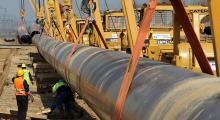Η αλληλεξάρτηση και ιδιαίτερα η ενεργειακή βρισκόταν πάντα στο επίκεντρο των στρατηγικών σχέσεων. Τα δίκτυα που αναπτύχθηκαν κατά την διάρκεια της μεταψυχροπολεμικής εποχής ιδιαίτερα στον άξονα Ανατολική-Δυτική Ευρώπη δημιουργούσαν πάντα την απορία για τις εκατέρωθεν στρατηγικές σκοπιμότητες. Ότι και να γίνει, οι εξελίξεις στην Ουκρανία έθεσαν επί τάπητος σκληρά ερωτήματα και φαίνεται ότι πολλά επανεξετάζονται. Δεν είναι εύκολο, βέβαια, δομές που κτίζονται επί δεκαετίες να αποσυναρμολογηθούν ξαφνικά. Θα συνεχίσουμε να παρακολουθούμε και να παραθέτουμε αναλύσεις που δείχνουν τις τάσεις. Εδώ είναι μια ανάλυση από τη δυτική σκοπιά.
Πηγή http://www.stratfor.com/sample/analysis/eu-stalls-natural-gas-deals-russia
(Sean Gallup/Getty Images)
Welded sections of the OPAL pipeline are laid near Lubmin, Germany, in 2010.
The European Union is responding to Russia’s foray into Ukraine by using one of the primary linkages between Europe and Russia: natural gas. On March 10, the EU Commission said it would delay a decision determining whether Russian energy major Gazprom could supply more natural gas to Europe through the OPAL pipeline in Germany. Meanwhile, EU Energy Commissioner Guenther Oettinger announced that negotiations with Russia on the legal status of the South Stream natural gas pipeline would also be delayed.
The competition over Ukraine is at the heart of the issue. Both pipelines enable Moscow to circumvent Ukraine as it delivers natural gas to its European consumers. By stalling the agreements, the European Union is showing its support for Kiev and signaling trepidation over forging stronger energy ties with Russia. But ultimately, these measures are largely symbolic; if an outright natural gas dispute erupted, the European Union would quickly come under pressure from its members to acquire Russia’s natural gas, Ukraine notwithstanding.
Analysis
Despite all the animosity surrounding the Ukraine crisis, the country’s importance as a natural gas transit state has necessitated Russo-European energy cooperation in the past. Two major natural pipelines were designed to bypass Ukraine entirely, mitigating the risk of Kiev disrupting flows. The Nord Stream pipeline, which was completed in 2011, brings Russian natural gas through the Baltic Sea to Germany. The South Stream pipeline, which is in the early construction phase, could bring natural gas from Russia across the Black Sea to Europe as soon as late 2015.
The Ukraine crisis has presented a dilemma to the European Union. If it takes too firm a stance against Russia, it could lose access to future natural gas supplies and invite potential disputes with Moscow. If it takes too soft a stance, it could undermine Kiev’s most useful bargaining chip in negotiations with Russia and take away an important source of revenue.
Postponing the OPAL decision and the South Stream negotiations clearly shows that the European Union has sided with Ukraine, at least for now. This corresponds with Brussels’ support of Ukrainian independence, hence its interest in seeing Ukraine develop alternative sources of natural gas and keep its negotiating position.
Few Options
But the European Union’s stance could change, given the importance of OPAL. It has a capacity of 36 billion cubic meters per year, but the European Union’s Third Energy Package prohibits Gazprom from using it to its full capacity. Russia and Germany, Russia’s most influential European energy partner, have long advocated for an exemption to the law, and Brussels will likely grant it partly because of German pressure and partly because it will help to reach an agreement with Russia over an investigation into Gazprom’s business practices, which the EU wants to see changed. The timing of the exemption will depend on how the standoff between Kiev and Moscow evolves.
That evolution will almost certainly involve disputes between Ukraine and Russia over natural gas delivery, but it probably will not affect Europe in the near future. European storage levels are relatively high, thanks to a mild winter, and natural gas consumption will drop as the season turns. In the short term, Europe would not be all that adversely affected by a potential natural gas shutoff. However, if the standoff persists long enough for stores to run low, the European Union would be pressed to open OPAL up to full capacity to offset losses in Ukraine. There would be less pressure on Brussels to expedite the South Stream pipeline, though as the completion date neared, countries through which it passes, such as Bulgaria, would pressure the European Union to reach an accord with Russia.
So even though the steps taken March 10 show how the Ukraine crisis is fueling the debate over European energy security, they are still largely symbolic. In fact, there is not much Europe can do to rehabilitate its dependency on Russian natural gas. According to the Czech Foreign Ministry, the Visegrad Group had asked the United States to facilitate liquefied natural gas exports to Europe — which is unfeasible in the short term. Another option is coal, which is currently inexpensive, and as such may be the best short-term solution for Europe, the environmental concerns notwithstanding.
The Europeans’ resolve to find alternative sources of energy may strengthen as the Ukraine crisis persists. But with the impending construction of the South Stream pipeline and the prospect of cheaper Russian gas, Moscow still has ways of incentivizing Europe to buy its energy commodities.


